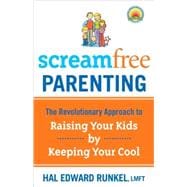
Note: Supplemental materials are not guaranteed with Rental or Used book purchases.
Purchase Benefits
What is included with this book?
HAL EDWARD RUNKEL is a licensed marriage and family therapist, relationship
coach, and international speaker. He is founder and president of ScreamFree
Living, Inc.—dedicated to calming the world one relationship at a time. Hal’s principles
have already helped thousands of families revolutionize their relationships. He lives
with his wife, Jenny, and their two children just outside Atlanta, Georgia.
The New copy of this book will include any supplemental materials advertised. Please check the title of the book to determine if it should include any access cards, study guides, lab manuals, CDs, etc.
The Used, Rental and eBook copies of this book are not guaranteed to include any supplemental materials. Typically, only the book itself is included. This is true even if the title states it includes any access cards, study guides, lab manuals, CDs, etc.
Excerpted from Screamfree Parenting: The Revolutionary Approach to Raising Your Kids by Keeping Your Cool by Hal Edward Runkel
All rights reserved by the original copyright owners. Excerpts are provided for display purposes only and may not be reproduced, reprinted or distributed without the written permission of the publisher.